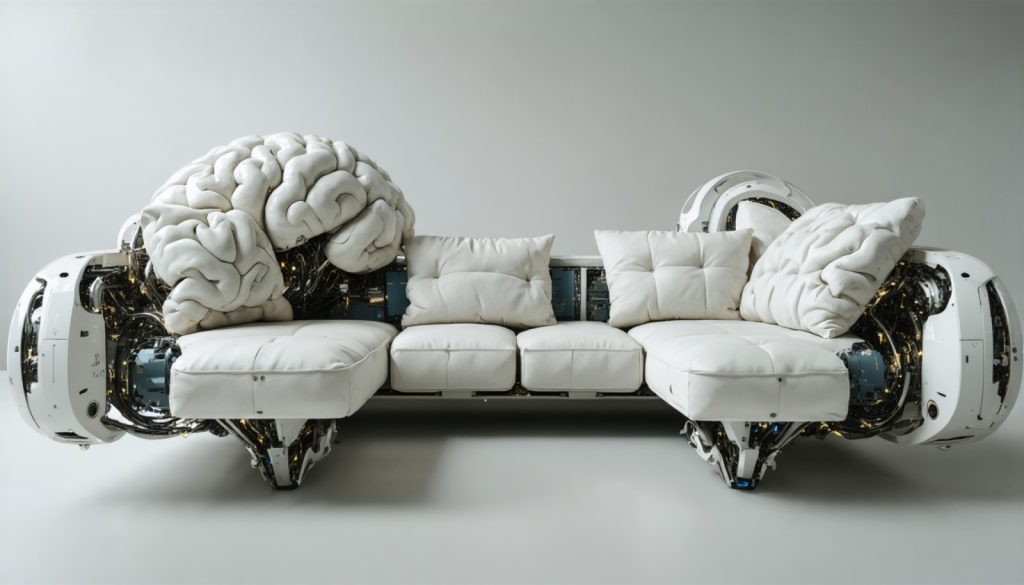
- AI revolutionizes the Furniture, Fixtures, and Equipment (FF&E) industry through enhanced manufacturing, sustainable practices, and consumer-centric designs.
- AI-driven manufacturing optimizes supply chains, reduces waste, and improves production precision while minimizing environmental impacts.
- Smart procurement and dynamic inventory control by AI eliminate inefficiencies and cut operational costs through predictive analytics.
- AI forecasts and shapes trends by analyzing vast data, allowing businesses to tailor products to consumer demands proactively.
- Mass customization is achieved through AI, elevating consumer satisfaction by offering personalized product features and designs.
- Sustainability is enhanced by AI’s ability to identify eco-friendly resources and optimize energy-efficient production processes.
- AI-powered virtual and augmented reality offer immersive customer experiences, redefining how consumers interact with and purchase furniture.
- Wood Couture leads in AI innovation within the FF&E industry, demonstrating the transformative potential of AI integration.
Artificial Intelligence (AI) is not just a buzzword—it’s an unstoppable force that’s redefining the Furniture, Fixtures, and Equipment (FF&E) industry. Picture a world where manufacturing processes are not only cutting-edge but sustainable, and consumer experiences are crafted with personal touchpoints at every step. The metamorphosis is happening now, and it’s utterly fascinating.
AI-Driven Manufacturing: Precision at Its Best
Gone are the days of guesswork and overproduction. With AI-driven supply chain optimization, manufacturers wield unprecedented power to predict trends and demands with uncannily precise accuracy. By analyzing historical data and current market behaviors, AI allows industries to reduce waste material, eliminate redundancies, and expedite production timelines. These advancements promise not only efficiency but also a reduction in environmental footprints, heralding a new era where smart meets sustainable.
Redefining Inventory and Smart Procurement
Envision a warehouse where AI reigns supreme, orchestrating a symphony of dynamic inventory control and automated procurement. Through predictive models, businesses can eliminate the bane of overstocking or unexpected shortages. This technological marvel assesses supplier reliability and automates orders, trimming inefficiencies and slicing operational costs. For FF&E firms, AI heralds rapid productivity surges and streamlined resource allocation.
Trendsetting with Data-Driven Fashion
The days of chasing trends are dwindling as AI steps into the spotlight, offering the ability to forecast burgeoning trends before they even take root. By meticulously dissecting broad swathes of data—from online chatter to consumer transactions—businesses can pre-emptively tailor their offerings to align with consumer desires. This forward-thinking approach ensures manufacturers not only keep up with fashion but shape it.
Personalization: Crafting Uniqueness with AI
In an age where individuality reigns, AI emerges as a master tailor, enabling mass customization like never before. Whether it’s a tech-imbued desk that morphs to your daily posture or a living room set that resonates with your unique style, AI’s role in furniture design is a testament to innovation. By empowering consumers to choose everything from materials to tech features, brands elevate customer satisfaction and cement loyalty.
Sustainability and AI: Partners in Progress
AI’s ability to foster sustainable practices is nothing short of transformative. Identifying waste reduction paths, advocating for eco-friendly resources, and optimizing every phase of production for energy efficiency, AI helps businesses craft greener futures. The FF&E industry stands at the threshold of innovation that custodies responsibility and showcases stewardship in environmental consciousness.
Immersive Customer Experiences: The Future is Here
Virtual and augmented reality, powered by AI, are reshaping how consumers interact with furniture. Imagine stepping into a virtual showroom where you can visualize items in your own space or altering designs interactively. This immersive engagement not only sparks delight but significantly drives sales while minimizing returns.
Pioneers of Innovation: Wood Couture’s AI Journey
A shining example of AI integration is Wood Couture. The company stands at the cutting-edge, marrying AI with every aspect of its operations. Through their insightful podcast series, they spotlight the breakthrough changes AI brings to design and sustainability. By equipping staff with AI tools and crafting a dedicated AI-focused division for procurement and customization, Wood Couture is setting the benchmark for intelligent manufacturing innovation.
Conclusion: Embrace the Future
As the FF&E industry undergoes this AI-fueled evolution, those who embrace these advancements are poised to redefine success—pushing the boundaries of innovation and sustainability. Wood Couture exemplifies this transformation, proving that AI is not just an addition but a catalyst for progress. The question remains: as the future unfolds, will you step into this brave new AI-driven world?
Unveiling the Future: How AI is Transforming the FF&E Industry Beyond Imagination
The New Paradigm of AI in FF&E
Artificial Intelligence (AI) is rapidly becoming a cornerstone in the Furniture, Fixtures, and Equipment (FF&E) industry, reshaping it with precision, personalization, and sustainability. As AI technologies evolve, they enable manufacturers to streamline operations, minimize waste, and anticipate consumer needs with unprecedented accuracy. The transformative power of AI goes beyond mere efficiency improvements, venturing into creating immersive consumer experiences and trendsetting capabilities.
How-To Steps for Implementing AI in Manufacturing
1. Data Collection and Analysis: Start by gathering extensive historical data, including consumer behavior and market trends. Utilize AI algorithms to analyze this data, identifying patterns and forecasting demand.
2. Automate Supply Chain Operations: Integrate AI-powered tools to enhance supply chain management. These can predict stock needs, optimize inventory, and automate procurement, significantly reducing costs.
3. Personalization Software Deployment: Implement AI tools that allow customers to personalize their choices. This can include selecting materials, colors, and even tech enhancements in furniture.
4. Sustainability Integration: Use AI to identify waste reduction opportunities and optimize energy usage throughout the production process.
Real-World Use Cases and Industry Trends
– Trendsetting through AI: Companies like IKEA are using AI-powered analytics to predict future furniture styles and materials, allowing them to stay ahead in the design game.
– AI in Personalization: Brands are employing AI to let customers design their furniture virtually, ensuring the product perfectly fits their aesthetic and functional preferences.
– Sustainability Initiatives: AI has helped brands like Wayfair reduce their environmental footprint by optimizing logistics and minimizing unnecessary transportation.
Market Forecasts & Industry Developments
The use of AI in FF&E is projected to accelerate, with the AI customer experience market expected to reach $15 billion by 2030, according to a study by Grand View Research. Advances in AI will likely drive more personalized consumer experiences and facilitate the creation of ultra-efficient supply chains.
Reviews & Comparisons: AI Tools for FF&E
Pros of Using AI in FF&E:
– Enhanced precision in trend prediction.
– Reduction in material waste and environmental impact.
– Improved customer satisfaction through personalization.
– Streamlined operations reducing human error.
Cons:
– High initial implementation costs.
– Need for ongoing data management and analysis.
– Potential for job dislocation in traditional roles.
Embracing AI for a Competitive Edge
For companies aiming to stand out in the FF&E industry, adopting AI-driven processes is no longer optional but essential. NFT-based ownership of furniture designs and AI-supported customer service are on the horizon, offering further avenues for differentiation. Companies should invest in AI education for staff and explore partnerships with AI solution providers.
Conclusion: Quick Tips for Immediate Application
– Start Small: Implement AI in a single aspect of your business, such as inventory management, and scale gradually.
– Invest in Training: Equip your workforce with AI knowledge to maximize the technology’s benefits.
– Explore Partnerships: Join forces with tech companies to develop custom AI solutions tailored to your specific needs.
Related Links:
– Forbes
– Grand View Research



